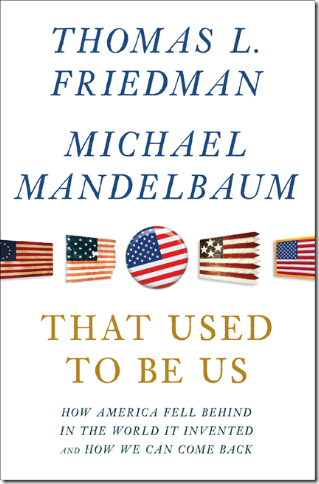Three years ago, Thomas L. Friedman sounded alarm bells about global warming in his best-selling book, Hot, Flat, and Crowded, but predicted that America would wake up before it was too late.
Now Friedman and co-author Michael Mandelbaum in their new book, That Used To Be Us, say they are frustrated, but still optimistic, about a range of issues, including global warming, galloping national debt, and lack of investment in education and infrastructure.
New York Times columnist Friedman and Johns Hopkins University professor Mandelbaum characterize the nation’s political and social paralysis as posing “a greater threat to our national security and well-being than al-Qaeda.”
The authors like lists. They cite the “big four” challenges: globalization, the information technology revolution, huge budget deficits, and soaring energy demands. Later, they describe the “five pillars of prosperity” and the “six things” needed to improve student performance.
Some recommendations are obvious, such as the cliché that schools need better teachers, plus parents who demand more from their children.
Throughout, the authors include inspiring examples to support their theses. Williams College in Massachusetts asks its graduating seniors to nominate a high school teacher who had the biggest impact on their lives. Four winners are then selected and honored at the Williams graduation as a way to celebrate the crucial role of inspirational teachers.
The book cites the extraordinary achievements of foreign and foreign-born students, and suggests that we have much to learn from them. In a recent college computer competition dubbed “Battle of the Brains,” only one of the 12 winning teams was from the United States. Or consider this nugget: A generation ago, the United States had the highest proportion of college graduates in the world. Today eight other nations rank ahead of America.
That Used To Be Us reads like an extension of Hot, Flat, and Crowded, in which Friedman asserted that America still had time to lead a “Green Revolution” on energy efficiency if it began immediately. Despite his warnings, there has been little progress.
If anything, the problems Friedman and Mandelbaum describe seem to have grown more urgent. A divided Congress cannot agree on a plan to reduce federal debt or steer the nation away from reliance on dirty fossil fuels, which contribute to global warming. The authors say Democrats and Republicans act “more like hostile tribes than colleagues with different political views but common goals.”
The book prescribes tough medicine: Congress must raise taxes, cut spending on defense, Social Security and Medicare, and invest in research and education.
Friedman and Mandelbaum say they have given up on the two-party system, which is “under the sway of powerful special interests.” They recommend formation of a new third party, which they concede could not likely win the presidency, but might force the major parties to embrace steps to restore America to its role as No. 1 world leader.
Like the previous book, this one contends that if America does not find a new source of clean energy, it runs “the risk of burning up, choking up, heating up, and smoking up our planet far faster than even Al Gore predicted.”
After reading this sober account of what ails America, readers may feel more pessimism than optimism, in part because no politician in either major party is promoting the agenda the authors have identified. Liberals resist cuts to entitlement programs, and conservatives are dead set against tax increases. The result is ballooning federal budget deficits and long-term debt.
That Used To Be Us is a well-written, thoroughly researched, and persuasive account of what ails America. It celebrates the social and economic virtues that turned the United States into a world leader, but warns that America has become flabby.
Friedman and Mandelbaum believe that people will have to “save more, consume less, study longer and work harder.”
“We need to reconnect with the values and ideals,” they write, “that made the American dream so compelling for so many generations of Americans, as well as for so many millions of people across the globe.” Despite the evidence of passivity and lack of leadership in both political parties, the authors remain optimistic, saying the nation has rarely failed to meet a major challenge.
Friedman and Mandelbaum say the present course, marked by Washington deadlock, cannot continue if America is to “come back,” in the words of the book’s subtitle. We can only hope that policymakers in Congress and the White House embrace the message in this important book.
Bill Williams is a freelance writer in West Hartford, Conn., and a former editorial writer for The Hartford Courant. He is a member of the National Book Critics Circle and can be reached at billwaw@comcast.net.
That Used To Be Us: How America Fell Behind in the World It Invented and How We Can Come Back, by Thomas L. Friedman and Michael Mandelbaum; Farrar Straus & Giroux; 380 pp.; $28
